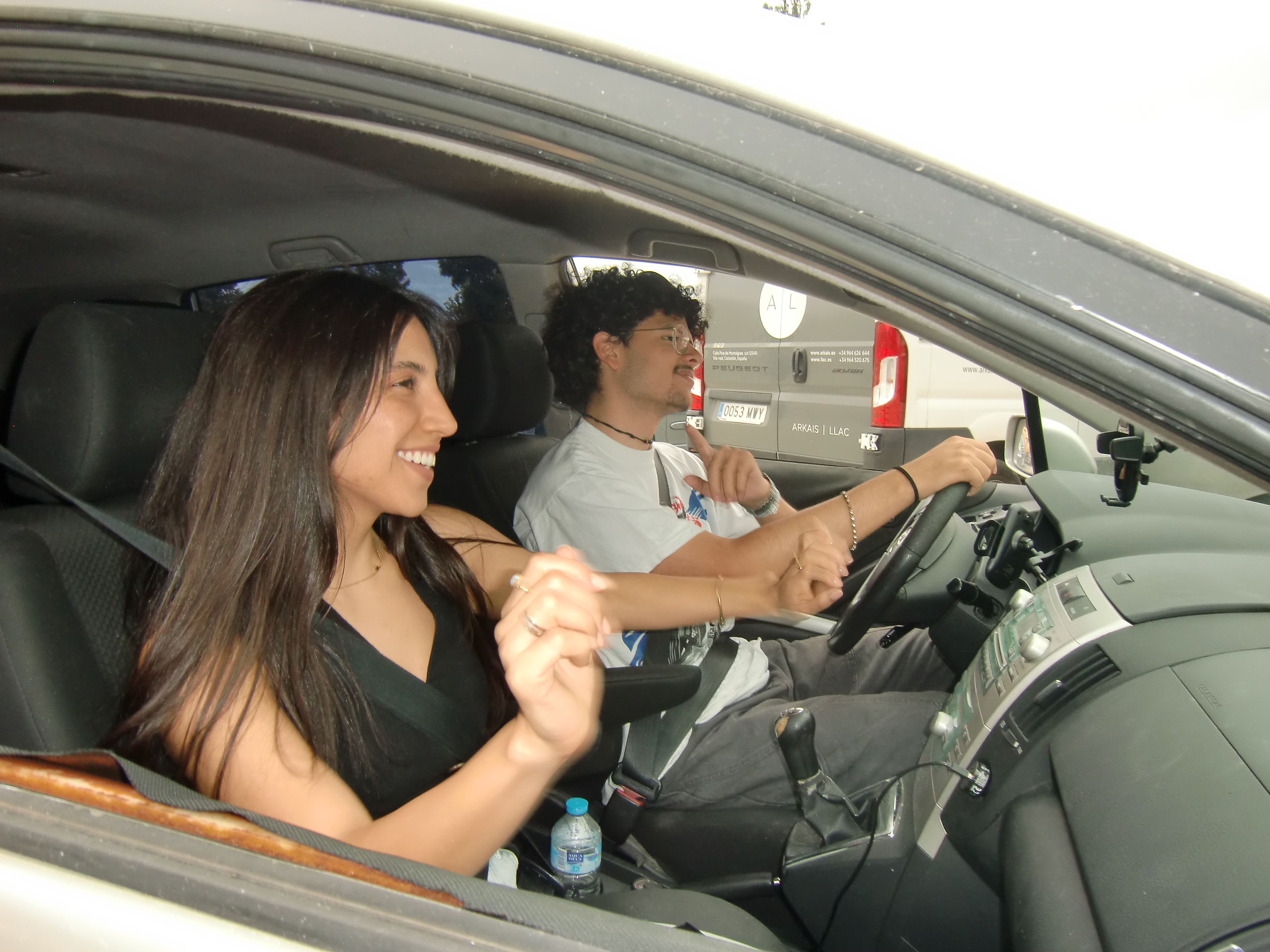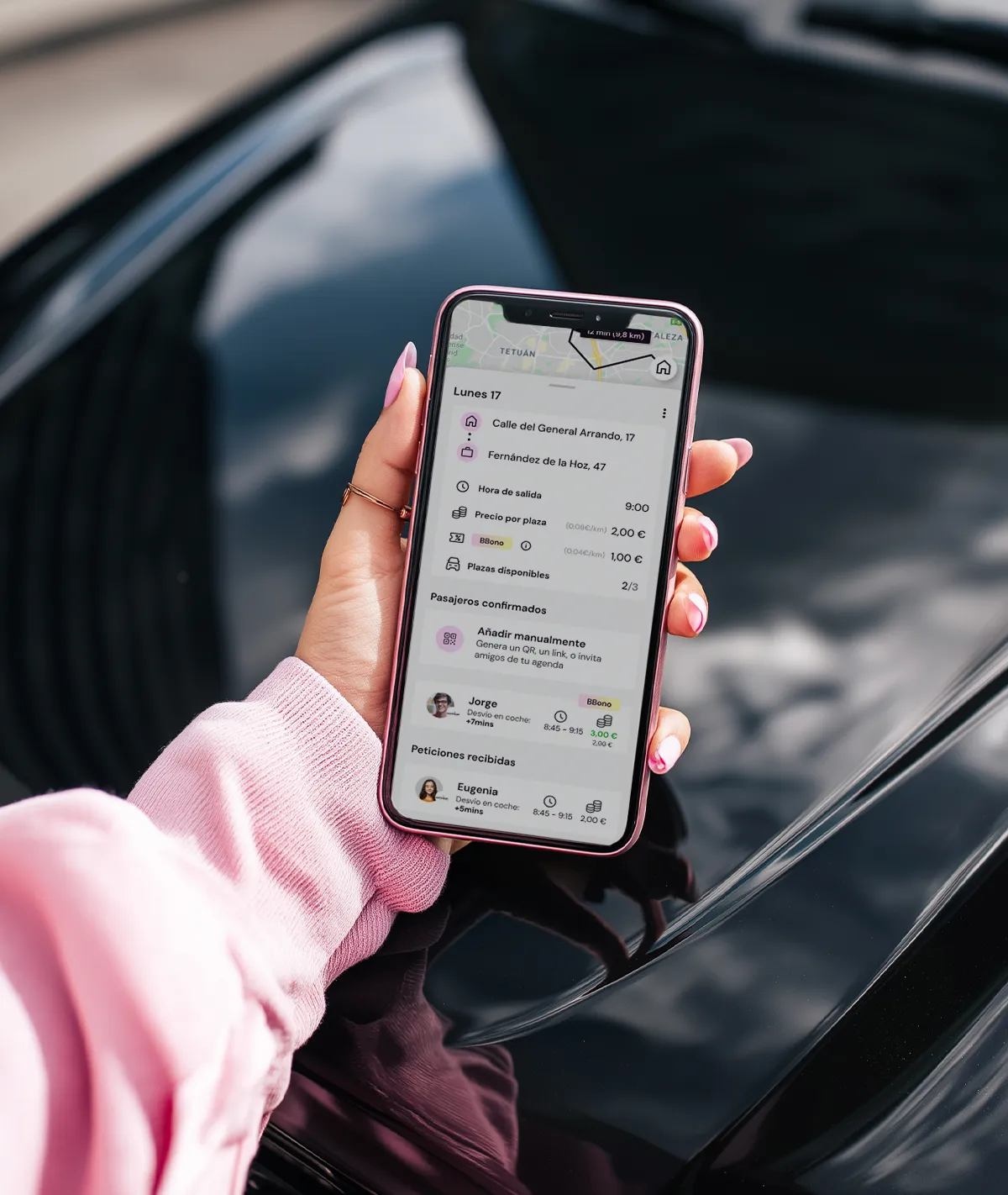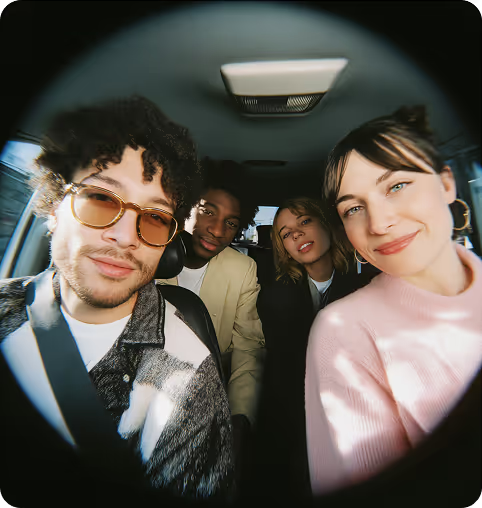The sustainable app that avoids empty car seats

The Madrilenian startup Hoop Carpool seeks to contribute to decarbonization through a shared culture.
On May 31, the Madrid metro closed one of its main arteries due to works: Line 6, the only one that traces a complete circumference around the city. Since then, more than 600,000 people from Madrid who used it every day have had to reinvent their commute. The scenes of collapsed platforms, endless lines for shuttles and overflowing buses have become part of the urban landscape. But while this is happening, thousands of private cars circulate every day with a single occupant: their driver. An everyday image, yes, but also a clear symptom of structural inefficiency.
LA RAZÓN listens to Paula Ibor, who works in the industrial sector of Zaragoza: “I don't have a car and public transport to where my company is is very complicated. Accepting the job without knowing how I would get around put a lot of stress on me. Knowing that I could share a car with other colleagues was a relief.”
This question is answered by the Madrilenian startup Hoop Carpool, who asked themselves the following question: What if the solution was not underground, but in the very free seats that are already rolling around the city? In other words, car-sharing becomes an effective, ecological tool with an immediate impact in the face of mobility chaos. “Hoop Carpool was born because we ourselves were suffering from the problem,” says Paloma Martín, CEO and co-founder of the company, along with three partners who also experienced daily traffic jams to get to class or work. “We wanted a more efficient, sustainable and humane way of moving. The result was, as they explain, a mobile application that allows safe sharing of routes between people with similar routes. With three clicks, the user finds a travel companion, with verified profiles, public reviews and secure chat. A system that has already allowed more than 300,000 shared trips and prevented more than 1.1 million kilos of CO₂. All this from an interface designed in Madrid, but designed to grow on a global scale.
Closing of the L6
The closure of Line 6 has been divided into two phases, and will last for months. In theory, the City Council and the Community of Madrid have deployed free shuttles, bus reinforcements and other palliative measures. In practice, many citizens report unpredictable times, exhausting queues and trips that have doubled in length. Sometimes, buses are not a very effective solution because they end up stuck in the same traffic jam generated by cars.
According to municipal data, around 5.7 million trips are made daily by private car in Madrid. The city is designed (and stuck) for that flow. But that number includes a huge percentage of vehicles occupied by a single person. That's where Hoop sees an opportunity to change the paradigm: to make better use of what already exists. In the weeks following the closure of L6, Hoop has registered a 27% increase in searches for routes in affected areas. “This indicates that citizens are looking for real alternatives. There is provision. We just need to facilitate the meeting,” says Paloma Martín.
The impact of car sharing is not only environmental, although the savings in emissions are significant, but it can also be economic. According to reports from the platform, a passenger can save up to 60 euros per month, and a driver more than 1,000 euros a year by sharing costs. But there's more: carpooling allows access to places that are poorly connected by public transport, improves family balance and reduces the stress of driving alone every day. It even encourages networking. “Many users tell us that they have made friends or business contacts while sharing journeys,” Paloma explains.
To consolidate trust, the app has identity verification and assessment systems, as in the main mobility platforms. “But there's an extra: Hoop is the only app in Spain certified to issue Energy Savings Certificates (CAEs). This tool allows companies that promote carpooling among their employees to prove their ecological impact, and even to monetize it. Thus, it also becomes a solution for sustainable corporate mobility”, they add.
From Las Rozas to CIU
Although the phenomenon of carpooling continues to face cultural resistance, such as the fear of sharing space with a stranger or simply the habit of going alone, Hoop has managed to grow thanks to key alliances: they already collaborate with municipalities such as Las Rozas, with companies such as PharmaMar, Takeda or Humana, and with universities such as UPM, UCM, UFV or URJC. In peripheral areas, where public transport is scarce or insufficient, its impact is greater: it reduces dependence on cars without sacrificing their usefulness. “People are more willing than they seem. What was missing was a simple, reliable tool that really worked,” says Martín. For now, Hoop manages 1,000 daily trips in Madrid, which avoid approximately 3,000 kg of CO₂ every day.
Assuming that sustainability starts with a firm commitment to public transport and modern and capable vehicles that contribute to decarbonization, there are situations that require complementary measures. The key is that, even if the car continues to exist, its use is optimized. Along this line, the shared car does not compete with the subway or the bus. In fact, it can complement them: on mixed routes where public transport does not arrive, or as a temporary solution to crises such as the closure of L6. It is also a tool against the collapse of the urban center: if fewer cars enter the city, it improves fluidity for everyone. “We want every empty seat in a car to be seen as an opportunity. It's not just an ecological question, but one of urban logic,” adds Martín.
Madrid as a mobility laboratory
In recent years, the Madrid City Council has launched several sustainable mobility initiatives: low-emission zones, parking limitations, and plans to electrify its bus fleet. But the real success of any public policy involves involving citizens. And that can only be achieved with options that are accessible, effective and attractive. With this premise, Hoop Carpool was born, and they position themselves as agents of change: they allow citizens to participate in the transformation of the city without the need for large investments or waiting for decades of construction. “Our message is simple: if you're already driving, don't go alone. And if you're looking for ways to get to work after the subway closes, see who's on your route. Most likely, there will be someone else,” Martín says.
Carpooling and the future of cities
From Madrid, Hoop Carpool has already expanded to other cities such as Barcelona, Valencia, and Seville, and is active in seven countries in Europe and Latin America, including Mexico, Colombia and Portugal. Its future plans include landing in the United States and consolidating its presence in industrial estates, hotels and areas with little connectivity. Because the problem, and the solution, is global. “80% of the time, cars are parked. And when they circulate, they are almost empty. That's unsustainable,” Martín warns. And in a world that seeks decarbonization, reducing emissions isn't an option: it's an emergency. And any measure that allows us to do so without sacrificing comfort, or waiting for decades, must be part of the conversation, including transitory measures.
Despite progress, there is still a long way to go. The members of this application believe that changing the mentality of drivers, integrating carpooling into public mobility policies, and normalizing the idea that car sharing is as natural as taking the subway or bus. “We are facing a cultural barrier rather than a technological one,” Martín says. “The challenge now is to build a new culture of displacement: more collaborative, more aware, and more efficient.” Therefore, while changes come with electrical or underground solutions, sharing mobility can also be part of the transition to decarbonization.



